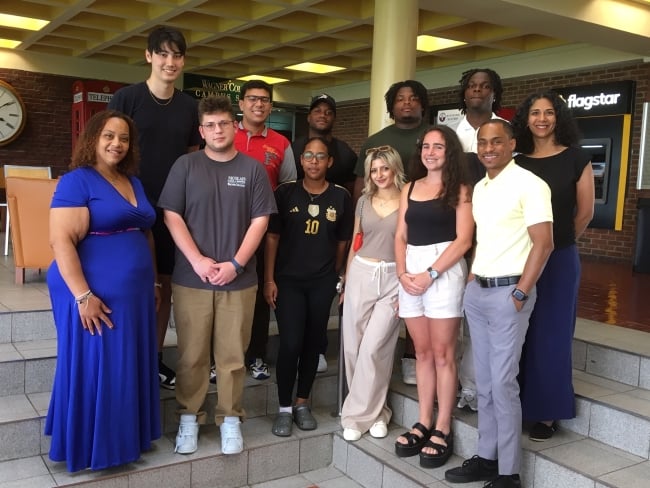You have /5 articles left.
Sign up for a free account or log in.

Wagner College’s summer 2024 Career Activators are flanked by Rosa Santana, left, director of Career Planning and Development, and Aarti S. Ivanic, far right, former dean of the Nicolais School of Business. The program provides professional development and experiential learning for students from underrepresented backgrounds in business.
Wagner College
Identifying next steps after graduation can be a challenge for many undergraduate students, but a number of college students say experiential learning experiences have helped guide their career goals.
A winter 2023 Student Voice survey from Inside Higher Ed found that, among students who have participated in experiential learning or an internship, 43 percent said it made them realize they want a career in that field or helped them pinpoint what tasks they enjoy.
In 2023, Wagner College in New York launched a three-week residential program for students from underrepresented backgrounds studying business to help them build professional skills and gain on-the-job training. The Career Activator Program exposes students to local organizations and businesses and gives them insight into the different paths to success.
What’s the need: Students from historically marginalized backgrounds, including low-income students, first-generation students and students of color, are less likely than their peers from more privileged backgrounds to participate in experiential learning or complete a paid internship, according to past research.
A recent study from the Business–Higher Education Forum found around half of students who wanted to intern in 2023 did not participate in an internship, and students of color, first-generation students, low-income students and community college learners were less likely to have landed an internship. Even among those who did have a position, a significant number of them had a “lower-quality” internship experience.
Wagner encourages students to participate in internship experiences, which the Career Activator Program accomplishes while also providing practical job skills and mentorship.
How it works: The Career Activator Program is open to sophomore or junior students in the Nicolais School of Business or sports administration students who are from an underrepresented background, including female-identified, ethnic minorities, LGBTQ+ or first-generation students.
In their application, students provide a cover letter, résumé and recommendation letter, plus complete an interview.
The program takes place twice a year on campus, in January and June, and the college provides room, board and meals to participants, as well as a monetary stipend.
Students commit to attending regular workshops about career experiences such as résumé writing, LinkedIn tools, personal branding and presentation and interview skills, and they participate in a two-week micro-internship or gig work for a local partner. Each micro-internship requires students to work around 20 hours per week, on-site or remotely, and could range from data gathering and analysis to social media marketing, human resources or community outreach. Workshops are led by career development professionals and external industry mentors.
Throughout the program, students also engage with a variety of career professionals, including during networking events, site visits and working alongside an alumni mentor.
The college receives financial support from sponsors and alumni donors, as well as a grant dollars from the KPMG U.S. Foundation New Heights program and National Grid’s Project C-Workforce Development grant. Funding is put toward covering student fees and providing incentives for community partners.
The impact: The program has served around 10 to 15 students per cohort, twice a year, since 2023. The hope is for the Career Activator Program to provide them with a springboard into a summer internship the summer of their junior or senior year and then eventually into full-time work, according to the college website.
To measure the program’s success, college leaders track student learning and student and employer feedback, as well as post-program metrics such as student internship placements and sustained relationships between alumni mentors and students.
In addition to helping students prepare for their lives after college, students build close relationships with their peers (whom they may not otherwise have met) as they live on campus together, promoting a sense of community and belonging.
An unintended benefit has been supporting student athletes’ career development. During the academic year, many of these students do not have schedules that allow for participation in internships or professional development workshops.
In the future, the college will expand the program to incorporate other majors, including arts administration, that reside in other divisions across the college.
Does your college have a career preparation program that could serve as a model for student success efforts? Tell us more here.




